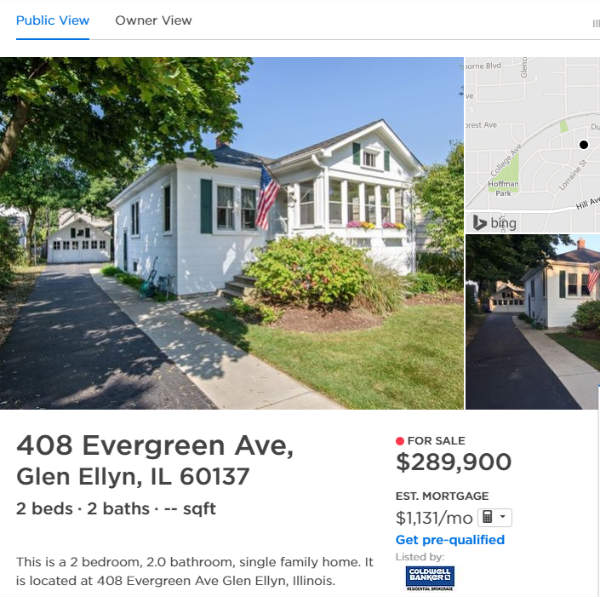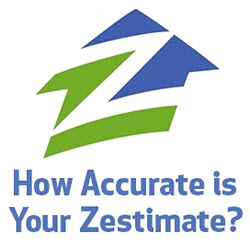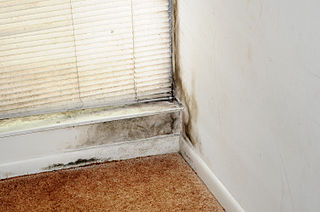
The widely watched lawsuit against Zillow for their “Zestimate” home estimate tool has been dismissed.
The outcome of this case was being watched by many in the real estate industry as well as homeowners themselves.
In the lawsuit against Zillow, Glenview homeowner and attorney Barbara Andersen alleged that the “Zestimates” Zillow posts act like an appraisal of home market value. This was alleged to be illegal because, under Illinois law, only licensed appraisers can issue home appraisals.
Case dismissed by judge
 The case went before a federal judge in Chicago and was dismissed on August 23rd on the grounds that Zestimates are a mere “starting point” that are unlikely to confuse homebuyers.
The case went before a federal judge in Chicago and was dismissed on August 23rd on the grounds that Zestimates are a mere “starting point” that are unlikely to confuse homebuyers.
U.S. District Judge Amy St. Eve stated: “Zestimates are not false, misleading, or likely to confuse. The word ‘Zestimate’ – an obvious portmanteau of ‘Zillow’ and ‘estimate’ – itself indicates that Zestimates are merely an estimate of the market value of a property.”
She further noted that Zillow has labeled the estimates clearly as estimates and includes information on its site detailing the ways in which the estimates can be inaccurate.
Judge Amy St. Eve also dismissed with prejudice the notion that Seattle-based Zillow violated the Illinois Real Estate Appraiser Licensing Act. This means the claim may not be brought before the court again.
The judge indicated that the plaintiffs could attempt to replead three other claims, including one for Zillow’s purported invasion of privacy for posting home values without permission.
Related: Cook County Assessor Faces Controversy Over Widespread Inequities
 The plaintiffs
The plaintiffs
The lawyer for the plaintiffs Barbara Andersen said her clients are looking into amending the complaint. “Zillow has unilaterally imposed its opinions on the value of homes without the consent of homeowners,” she stated. “It impairs people’s ability to sell their homes because the estimates do not comply with recognized appraisal standards, and some are way too low.”
Zillow
A Zillow spokeswoman said the company was pleased with the judge’s ruling. “The Zestimate has proven itself to be a sought-after and valuable free tool for consumers.”
Zillow stock moved up slightly the next day and its value has been increasing slowly since.
Related: Real Estate Tax Exemptions Cook County
End of the case against Zillow?
This may be the end of the case for now. We will have to wait and see if the plaintiffs decide to move forward with amending the complaint and bringing it before the court once again.
* Advertising Material: To the extent that the information in this post is interpreted as attorney advertising in accordance with the Illinois Rules of Professional Conduct or within the meaning of state bar rules from all other localities, this statement is made pursuant to those rules.
Specialties: Specialization claims are prohibited by Illinois Supreme Court Rules and we do not claim to be specialists. The content of this e-mail is organized and presented for the sole purpose of general information. None of the included content should be construed as legal advice. Viewing this e-mail or e-mailing the account holder does not create an attorney-client relationship. NOTICE: This page may be considered advertising material.
 The Law Offices of Lora Fausett P.C. provides real estate law services including loan modifications, buying and selling legal assistance, short sales and deeds in lieu, mortgage foreclosure defense, and others.
The Law Offices of Lora Fausett P.C. provides real estate law services including loan modifications, buying and selling legal assistance, short sales and deeds in lieu, mortgage foreclosure defense, and others.
Located in Glen Ellyn, Illinois and serving clients in DuPage, Cook, Kane, Will, and Kendall Counties.
For Information Call 630-858-0090
Sources:
Zillow wins dismissal of ‘Zestimate’ lawsuit in U.S. – Reuters
Zillow ‘Zestimates’ lawsuit dismissed – Crain’s Chicago Business
Zillow’s home-price ‘Zestimates’ survive legal challenge – MarketWatch
Illinois homeowners lose bid to sue Zillow over ‘Zestimates’ – BizJournals.com
‘Zillow Zestimates’ Class-Action Lawsuit Dismissed – InvestorPlace



 The Tribune alleged that the
The Tribune alleged that the  It doesn’t help Berrios’ case that
It doesn’t help Berrios’ case that  After the meeting, Cook County Board President Toni Preckwinkle announced that a group called Civic Consulting Alliance would perform a review of the property tax assessment system.
After the meeting, Cook County Board President Toni Preckwinkle announced that a group called Civic Consulting Alliance would perform a review of the property tax assessment system.
 Zillow maintains that its approximations are not actual appraisals, nor do they claim to be.
Zillow maintains that its approximations are not actual appraisals, nor do they claim to be. Did you know that mold disclosure forms are not required by Illinois law in real estate transactions?
Did you know that mold disclosure forms are not required by Illinois law in real estate transactions? Disclosure of lead paint is required by federal law
Disclosure of lead paint is required by federal law